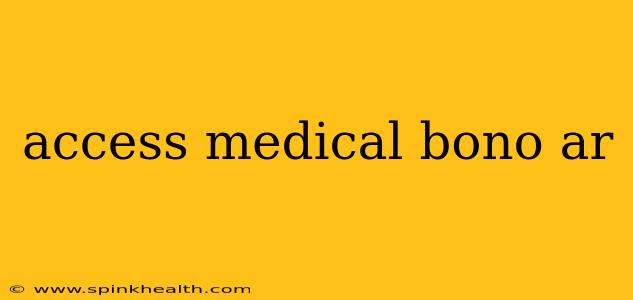Accessing Medical Care with Limited Financial Resources: A Comprehensive Guide
The need for affordable healthcare is a universal concern. Many individuals and families struggle to access the medical care they need due to financial constraints. This guide explores various avenues for obtaining medical assistance when you're facing financial hardship. We'll delve into several options, providing practical information and resources to help you navigate this challenging situation.
What is considered "bono" medical care?
The term "bono" (often used in Spanish-speaking regions) generally refers to pro bono services, meaning services provided free of charge or at a significantly reduced cost. While the specific terminology may vary, the underlying principle remains consistent across different healthcare systems and languages: accessing medical care without incurring significant financial burdens.
Where can I find free or low-cost medical care?
Finding affordable healthcare often requires a multi-pronged approach. Let's explore some common options:
1. Federally Qualified Health Centers (FQHCs):
FQHCs are community-based health centers that provide comprehensive primary care services on a sliding fee scale. This means the cost of care is based on your income, ensuring affordability for low-income individuals and families. They often offer a wide range of services, including medical, dental, and behavioral health care. Locating your nearest FQHC is usually as simple as an online search.
2. Hospital Financial Assistance Programs:
Many hospitals have financial assistance programs designed to help patients manage their medical bills. These programs often offer discounts, payment plans, or even waive charges based on individual financial circumstances. It's crucial to contact the hospital's billing department directly to inquire about their specific financial assistance policies.
3. State and Local Health Departments:
State and local health departments frequently offer free or low-cost healthcare services, particularly for preventive care and treatment of specific diseases. These services may include immunizations, screenings, and treatment for infectious diseases. Contact your local health department to learn more about available programs in your area.
4. Charity Care Programs:
Some hospitals and healthcare providers offer charity care programs, providing free or reduced-cost medical services to individuals who meet specific income and asset requirements. These programs are usually designed for those facing extreme financial hardship. Eligibility criteria vary widely, so contacting individual providers is essential.
5. Non-profit Organizations:
Numerous non-profit organizations dedicate themselves to providing healthcare access to underserved populations. These organizations often offer a range of services, from direct medical care to financial assistance for medical bills. Researching local non-profit organizations focused on healthcare access can uncover valuable resources in your community.
6. Volunteer Clinics:
Many communities have volunteer-run clinics offering free or low-cost medical services. These clinics often rely on the generosity of volunteer medical professionals and operate on a limited basis. Finding a volunteer clinic in your area requires local research.
7. Medicaid and CHIP:
Medicaid and the Children's Health Insurance Program (CHIP) are government-funded healthcare programs that provide coverage to low-income individuals and families. Eligibility criteria vary by state, but these programs are a vital resource for accessing affordable healthcare.
How do I apply for financial assistance programs?
The application process varies depending on the specific program. Generally, you'll need to provide documentation proving your income and household size. Some programs may also require proof of residency or other relevant information. Thoroughly review each program's application requirements before submitting your application.
What if I still can't afford medical care?
If you've explored all the options and are still unable to afford necessary medical care, consider seeking legal counsel. Legal aid organizations can provide guidance and assistance in navigating complex healthcare financial issues.
Remember, accessing affordable healthcare doesn't have to be an insurmountable challenge. By researching available resources and actively seeking assistance, you can improve your chances of receiving the medical care you need. This guide provides a starting point. Your journey toward finding appropriate care begins with proactive research and communication with healthcare providers and community resources.

